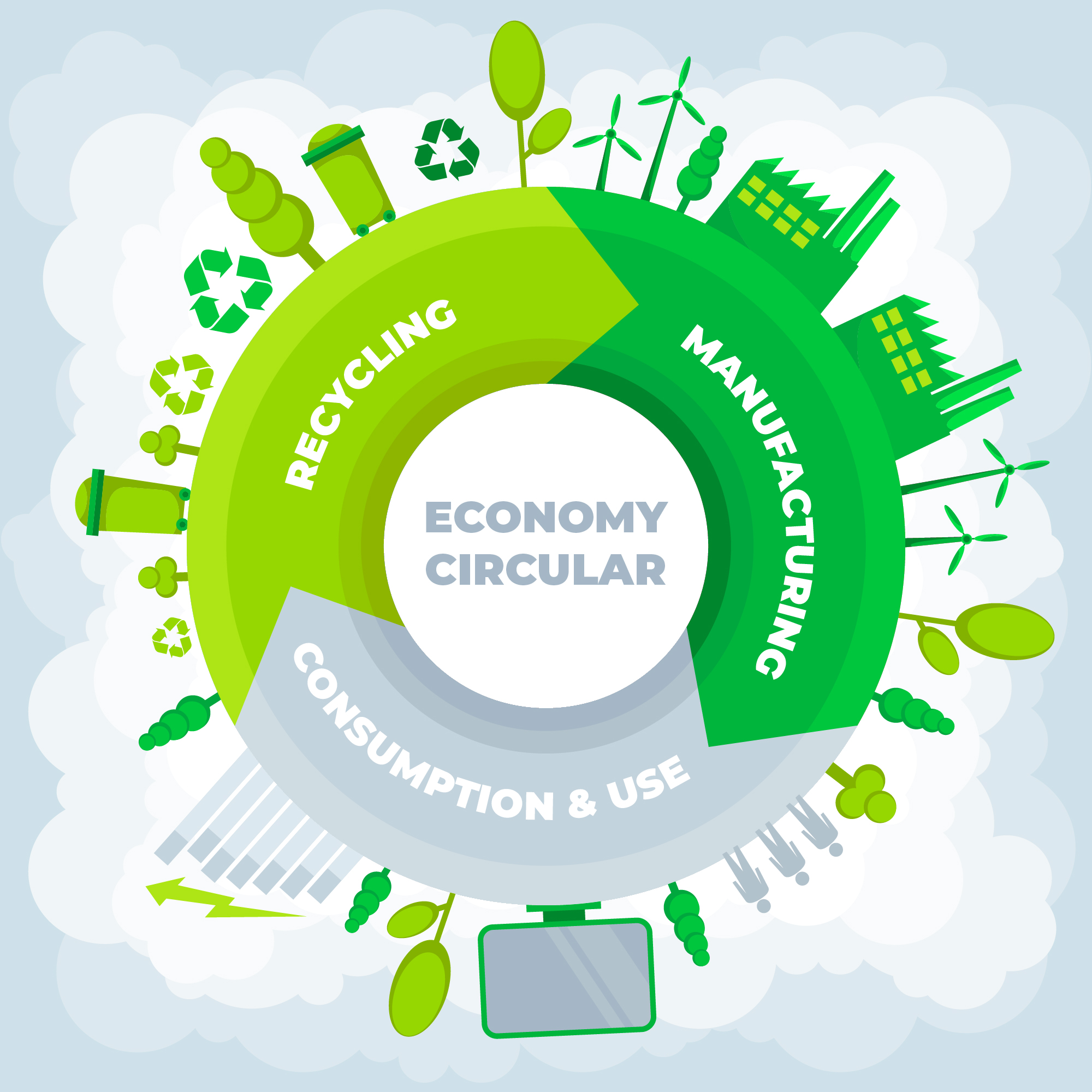About This Course
How to access this course:
- Enroll in the course
- In an email, please write down the email address that you used for logging in on the platform and send this email address to fransson.kth@outlook.com (we will activate your account in this way)
- After logging in to the EEDA platform please head back to this page for full access.
Please do not hesitate to send an email to fransson.kth@outlook.com if you come across any difficulties in registering for the course!
Freemium vs Premium:
This is a Freemium (=completely self-paced) version of the course. As such it is continuously open. There is no "real-life" instructor involved.
All the learning reosurces can be used for free after registration. It is possible to, for a fee, receive a "Certificate of Completion of the Course through Automatically Corrected Assignments".
Course Abstract:
The course "Circular Economy Towards Energy consists of two major parts on
- Introduction to Circular Economy from an overall perspective and
- Introduction to Life Cycle Analysis,
separated into 6 lessons. The content is intended to
- inspire the learners towards reflections upon the society we live within,
- give an overview of the opportunities (and threats) humanity and the "Spaceship Earth" stand in front of, and
- to give a solid technical, scientific, societal and responsibility ground-work for the learners to build upon in their future careers.
The course is run completely in the "Flipped Classroom" mode in which the learners are engaged in self-learning through the various modules, including to answer the formative and summative assessments. In the process the learners are requested to discuss pre-determined (and other) questions between themselves to enhance the peer-learning perspective.At the end of each lesson there is a synchronous discussion with the instructors involved in the different modules
Each lesson is separated into a number of "Content" and "Assessment" Modules. Using the "Flipped Classroom" perspective the learners can work on this at their own speed and interest, while having the synchronous discussions as the main final outcome.
The course contains the following 6 lessons:
-
Part 1: Introduction to Circular Economy for Energy
- Lesson 1: Overview of Circular Economy (Guide: Ruchira Abeyweera, OUSL, Sri Lanka)
- Lesson 2: Key features of the CE (Guide: Senajith Kalpage, UoP, Sri Lanka)
- Lesson 3: Circularity of materials life cycle (Guides: Maheshi Danthurebandara and Senajith Kalpage, UoP, Sri Lanka)
- Lesson 4: Resource recovery systems/ approaches (Guide: Senajith Kalpage, UoP, Sri Lanka)
- Part 2: Introduction to Life Cycle Analysis
- Lesson 5: Global environmental issues and energy industry (Guide: Maheshi Danthurebandara , UoP, Sri Lanka)
- Lesson 6: Life cycle thinking for sustainable use of resources (Guide: Senajith Kalpage, UoP, Sri Lanka)
The course ends with a "Wrap-up" lesson ahead of the final course exam. This lesson can only be accessed by learners who have passed all the previous modules and handed in the respective summative assignments.
Course Uniqueness:
This Course is unique, being one of the courses in the subject area of circular economy, as it provides the learners definitions and key features of circular economy paving the way for other courses in the subject area that refers to a range of resources available in this subject across the globe, hence providing the learners to explore circular economy concepts and reflect upon them with active learning for in-depth understanding
Course Societal Relevance:
This Course has a high relevance to the society as circular economy as a complete topic encompasses all the areas of society including materials, energy, environment, policies, technologies etc.
Course Evaluation and Grading Criteria:
- The ("freemium") course evaluation is done through the automatically corrected questions in each Content Module of the course.
- The grading criteria of each Content Module is "Pass/Fail".
- To receive a "Pass" of the full course each one of the Content Modules have to be successfully completed.
Course Level as per Qualification Framework:
This course corresponds to the European Qualification Framework EQF xxx
Estimated Learning hours:
This course corresponds to xx SMCTS-credits ("Stackable Master Credit Transfer System), which translates into xxx Estimated Learning Hours (ELH).
Course Intended Learning Outcomes (CILO):
Knowledge:
- K1: Describe in broad terms what implies the economy. (corresponds to EQF-K= yy)
- K2: Explain how a circular economy is different from a linear economy. (corresponds to EQF-K= yy)
- K3: Explain why it is needed to move towards a circular economy. (corresponds to EQF-K= yy)
Skills:
- S1:Defend the circular economy against linear economy. (corresponds to EQF-S= yy)
Responsibility and Autonomy:
- RA1:Pursue circular economy concepts . (corresponds to EQF-RA= yy)
Course Structure:
This introduction course to LTI-Based Circular Economy consists of two parts. Part 1 is "free-ware", self-paced, open and continuously available with a set of Content Modules. An add on (Part 2 of the course, identiified as "premium") is directed towards instructor-led discussions, workshops and assignments. This part is offered only to learners registered in an organization associated with EEDA
The Part 1 ("freemium" version) has 06 Lessons for efficient learning of the subject, all including a set of automatically corrected questions and exercises. It has furthermore a few discussion sessions in which the instructor gives his perspective on some general, but important, open-ended questions and discusses solutions to a few of the exercises.
Suggested study pace:
This "freemium" course contains 06 Lessons, each one with different modueles and a set of questions and exercises. For accumulating the knowledge, answer all the various questions, perform the exercises and achieving the Intended Learning Outcomes of each one of the Content Modules in a smooth learning journey, the learner is recommended to, if the learning period is more than 10 weeks, finish one module per week.
How Will This Course Broaden My Skills and Help My Career?
A circular economy course can significantly broaden your skills and help your career in several ways:
- Understanding of the circular economy concept : The course will provide you with a comprehensive understanding of the circular economy, its principles, and how it differs from the traditional linear economy. This knowledge will help you to identify opportunities for implementing circular economy practices in your organization or industry.
- Strategic thinking: The course will teach you how to think strategically about resource management, waste reduction, and value creation in a circular economy context. This skill will enable you to develop innovative solutions that can help your organization to reduce costs, increase efficiency, and enhance its reputation.
- Collaboration and stakeholder engagement: The course will emphasize the importance of collaboration and stakeholder engagement in achieving a circular economy. You will learn how to build partnerships with suppliers, customers, and other stakeholders to create value and reduce waste.
- Circular business models: The course will introduce you to various circular business models such as product-as-a-service, closed-loop supply chains, and sharing platforms. These models can help your organization to generate new revenue streams, reduce costs, and enhance customer satisfaction.
- Circular design: The course will teach you how to apply circular design principles to product development and innovation. This skill will enable you to create products that are more sustainable, durable, and resource-efficient.
- Measuring and reporting : The course will cover methods for measuring and reporting on circular economy performance. This skill will enable you to communicate the benefits of circular economy practices to stakeholders and demonstrate your organization's commitment to sustainability.
Overall, a circular economy course can provide you with a range of skills that are highly valued by employers in today's increasingly sustainable and resource-efficient business environment. By acquiring these skills, you can enhance your career prospects and contribute to a more sustainable future for your organization and society as a whole.
Prerequisites
To have a successful individual learning journey it is recommended that the learner has a background corresponding to the first year of university engineering studies.
Base of the Course:
The material is based upon a course given by Ruchira Abeyweera, Program Coordinator of
The Open University of Sri Lanka (OUSL), Nawala, Nugegoda, Sri Lanka. .
Certificates and Credits
Any learner who graduates from the "freemium" version of the course after successful completion of all the automatically corrected questions and exercises can print an EEDA certificate of achievement.
Learners who are registered at an organization offering this course in an instructor-led fashion need to consider any special conditions this organization will have for issuing any certificates or credits from that organization.
Course Staff
Ruchira Abeyweera
Position: Master Program Coordinator
Affiliation: The Open University of Sri Lanka (OUSL), Nawala, Nugegoda, Sri Lanka
Contact: r_abeyweera@hotmail.com


